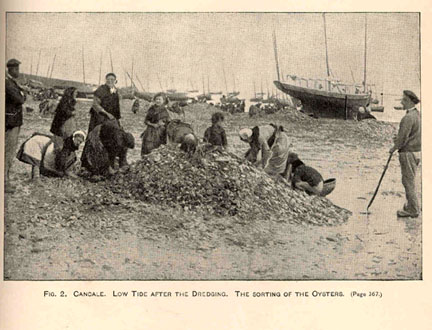Oysters are certainly experiencing a revival in the U.S., but for a culture that means Serious Business about its oysters, look no further than France. After all, they are Europe’s number one grower, exporter and consumer of oysters, indulging in 4.5 lbs per capita, compared to a miniscule quarter pound for the average American. In addition, France is home to the Belon River, the namesake of the illustrious Belon oyster, or European Flat.
At this time of the year, France overflows with street side oyster stands, teeming with baskets of oysters, each carefully sorted by size. Oystermen from the Atlantic Coast pack their harvest and drive to Paris, where the city’s hunger for oysters knows no bounds. An astounding 50% of France’s oyster consumption takes place between Christmas and New Year’s. This is in part due to the season (oysters are at their peak flavor when the water gets cold and they begin storing glycogen), and partly due to their association with holiday feasts. In France, no New Year’s celebration would be complete without oysters, slurped from their shells with a glass of crisp white wine.
In Brittany, the oyster trail runs even thicker. This is the heart of France’s oyster country and Cancale is the so-called “oyster capital.” It is said that King Louis XIV had fresh oysters delivered from Cancale to Versailles every day. Unfortunately, the native Brittany oyster has mostly died off, a victim of disease, harsh winters and human gluttony. To replace it, Pacific oyster larva was brought from Japan to France in the 1980s. Today, 95% of farmed oysters are Pacific oysters, and the rare Belon oysters are three times more expensive than their hardier counterparts.
It may be nearly impossible for you to eat a Brittany-grown Belon in the U.S. (95% of French oysters are consumed domestically), but there is an alternative—Belons grown in Maine. Back in the 1950s, scientists transplanted Ostrea edulis seed to Boothbay Harbor in Maine. The seed happily transplanted itself into the Damariscotta River and went wild, resulting in oysters that pack a powerful punch of sea and mineral. This adventurous flavor profile certainly befits the oyster’s far-flung travels.
To try a Belon for yourself, give our sales staff a call today.
